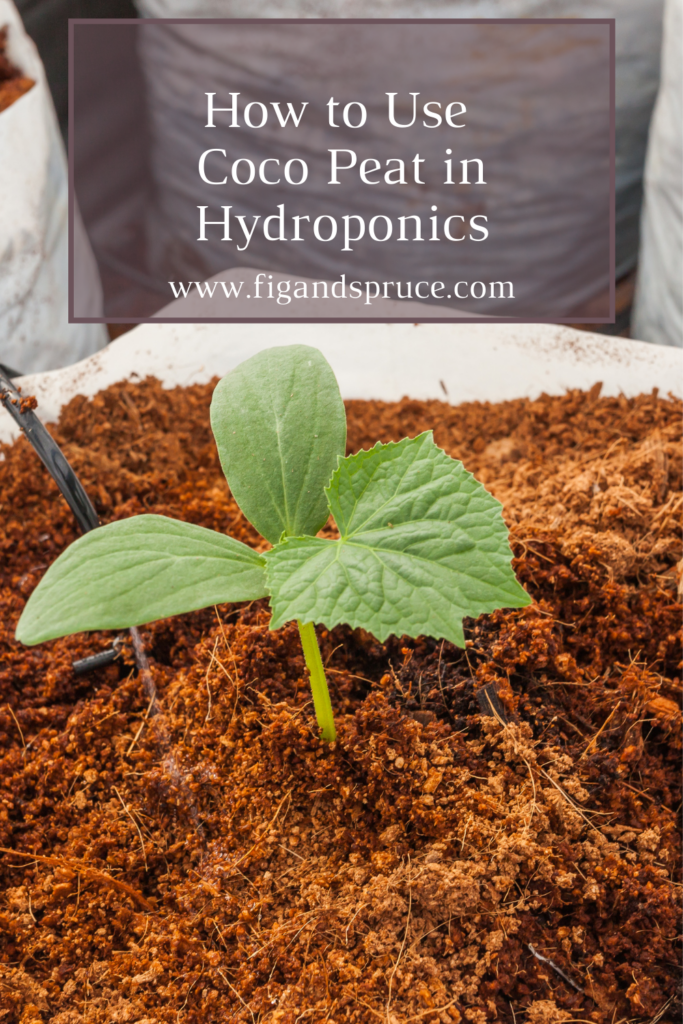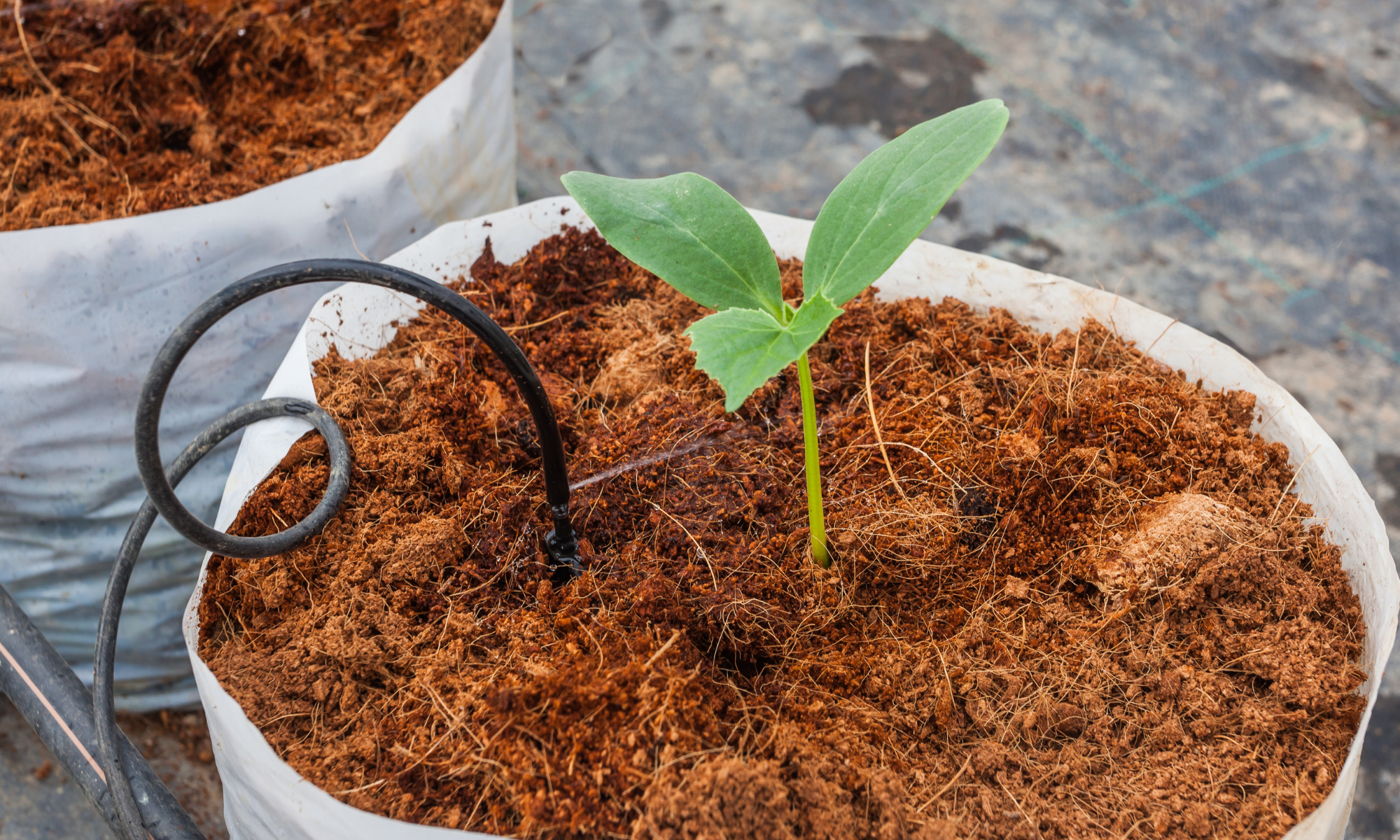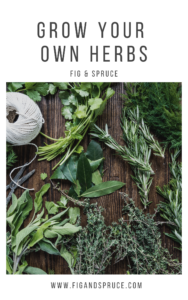Ever wondered how to use coco peat in hydroponics, or even what it is? Continuing our exploration of different growing mediums for hydroponics, we are covering one of the more well known mediums today – coco peat!
Table of Contents
What is Coco Peat?
Coco Peat, a type of coco coir, is made up of coconut fibers. Specifically, its the spongy material that binds the coconut fiber to the husk of the coconut. It is a growing medium used frequently by gardeners, and is specifically well suited for hydroponics for multiple reasons. The main reason being its high water retention.
Coco peat looks similar to peat moss, but has a rich darker brown color. It can be used not only in hydroponics, but in regular gardening, seedling germination, and more!
Where can I buy Coco Peat/Coco Coir?
Coco peat is a little more niche than your local gardening store might be.
We recommend searching online for this growing medium. There’s a wide variety available online, but if you venture to a local store there is a chance they won’t carry it.
This option on Amazon from Plantonix is a high quality coco coir mix. Its 100% organic material, and has very low salt content (we’ll get into this more later and why its important!).

Pros of Using Coco Peat in Hydroponics
First, lets discuss the pro’s of using coco peat in hydroponics.
Coco Peat is a Natural and Sustainable Material
We love coco peat as an option because its an all natural product that is made from a sustainable material. The process for creating coco peat is also very efficient.
On average a coconut tree produces 150 coconuts annually, and coco peat uses a part of the coconut that would otherwise often get wasted.
High water retention
The most obvious reason that makes coco peat a good grow medium for hydroponics is its high water retention. As with other grow mediums, this is super important for hydroponic growing.
Reusable
Another pro for sustainable-minded gardeners is that coco peat is a reusable medium. With proper care coco peat can be used time and time again. Compare this to your typical potting soil that you have to throw away after one plant’s use, this is a much more sustainable alternative.
Exposure to air
Because of how fibrous coco peat is, it leaves a lot of room for air to get to your plants roots. Its good for plants to be able to breath a little, so this air flow is an added benefit of using coco peat.
Rich in nutrients
Coco peat is naturally rich in nutrients like potassium, zinc, iron, manganese, and copper. All of these nutrients will benefit your plants when using coco peat in hydroponics.
Cons of Using Coco Peat in Hydroponics
Now – lets discuss some of the con’s of using coco peat in hydroponics.
High amount of Salt
Depending on what type of coco peat you choose or how it was produced, some coco peat can have a very high salt content.
If the coconut husks were soaked in salt water during processing, you’ll need to rinse with fresh water prior to use in your garden. This will take care of the problem, but its something to be aware of that could add an extra step in your setup.
Some Coco Peat is treated with Chemicals
Depending on which brand of coco peat you’re using, it may have been treated with chemicals during processing.
The chemical residue could potentially affect plant growth, so we recommend reading the manufacturer’s label prior to purchasing.
Lacking Necessary Nutrients
This sounds counterintuitive to one of our earlier pros – but hear us out! While coco peat has a lot of nutrients present naturally, its lacking some of the added nutrients found in traditional potting soil.
For this reason, you’ll definitely want to ensure you’re adding a plant nutrient when using coco peat in hydroponics.
How to Use Coco Peat in Hydroponics
Now – lets go over the steps to using coco peat in hydroponics.
What you’ll need

Steps to Use Coco Peat in Hydroponics
Step 1 – Rinse and Soak the Coco Peat
When you receive the coco peat, it will come in a dried block that needs to be broken up. To do this you’ll need to soak the block in water and mix well to get it to break down into a usable form. The coco peat should break apart easily after soaking for 10 minutes. If it doesn’t, add more water as needed.
Note that if your coco peat is processed using saltwater in the manufacturing process, you’ll want to rinse the coco peat before soaking. Check your manufacturing label to understand it uses saltwater. Rinse until water runs clear (it will start brown) and then soak for 10 mins.
Step 2 – Add Nutrient Solution
Coco peat is rich in natural nutrients, but lacking a lot of what traditional potting soil has already added in. We recommend adding a nutrient solution to your coco peat to ensure your plant has everything it needs to thrive.
Step 3 – Plant as normal
From here its pretty self explanatory. You’ll continue planting either in your hydroponic grow system or elsewhere as normal! Coco peat is fairly easy to use, which is why its popular among new growers!
Other uses of Coco Peat
Lets go over a few other uses of coco peat. These are great options if you’ve got some left over after your hydroponic garden is planted!
Seed Germination
Often coco peat is used for germinating seeds prior to planting in planters. The high moisture retention helps seeds germinate quickly and efficiently.
Mix into Potting Soil
Often to improve drainage or increase air exposure for plants roots, gardeners will mix coco peat into potting soil to create a hybrid growing medium.
Frequently asked questions
Now, lets go over a few frequently asked questions about using coco peat in hydroponics.
Should I use Coco Peat by itself for Hydroponics?
Short answer – you can! Often times gardeners will mix coco peat with other types of coco coir such as coconut fiber or coco chips. Doing this will help reduces the water retention. Some gardeners find that coco peat by itself risks drowning plants roots. However, you can experiment with a mix of mediums and using just coco peat by itself may work for you!
Do I need a hydroponic grow system?
Nope! Coco peat can be used in a hydroponic grow system, or in a DIY setup. Feel free to explore and experiment as much as you want. You can even use coco peat in traditional planters!


